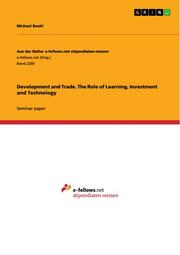Detailansicht
Development and Trade. The Role of Learning, Investment and Technology
Aus der Reihe: e-fellows.net stipendiaten-wissen 2260
ISBN/EAN: 9783668389557
Umbreit-Nr.: 2008595
Sprache:
Englisch
Umfang: 32 S.
Format in cm: 0.3 x 21 x 14.8
Einband:
kartoniertes Buch
Erschienen am 07.02.2017
Auflage: 1/2017
€ 18,95
(inklusive MwSt.)
Lieferbar innerhalb 1 - 2 Wochen
- Zusatztext
- Seminar paper from the year 2008 in the subject Economics - Other, grade: 1.7, University of Tubingen (Wirtschaftswissenschaftliche Fakultaet), course: International Economics (Hauptseminar), language: English, abstract: In order to achieve economic development, here understood as GDP growth, it is often suggested that developing countries would only need to ensure free trade and good institutions. Nevertheless countries pursuing institutional quality and trade openness, namely in Latin America, have failed to achieve sustainable economic development. Meanwhile others, namely in South and East Asia, have achieved remarkable economic growth rates, without functioning markets and property rights in place. The questions I try to answer are: How can a theoretical framework be designed to explain the mentioned inefficiencies of the laisez-faire equilibrium in comparison to a socially optimal situation? Can it be argued that the above mentioned diverging growth success of different developing countries has been due to varying quality of chosen policy options? Do, by their enhancement, Rodrik and Hausmann explain the seemingly anomalies within the established theory on development economics?
